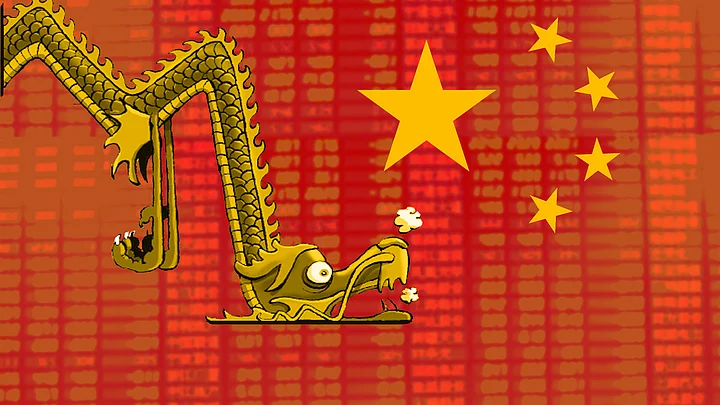Less than 30 minutes. That’s how long Chinese markets were open before trade was halted on Thursday after a massive decline which triggered automatic circuit breakers.
In fact, the Chinese securities regulator suspended its recently implemented circuit-breaker system later in the day as many believed that they were adding to the panic selloff.
This is the second time that trade was halted in Chinese markets this week, after a similar halt on Monday. This comes after the Chinese central bank cut its yuan reference rate by the most since August, sparking a selloff in stocks that forced the $6.6-trillion market to shut early. The government by guiding the yuan sharply lower may be signalling that they are prepared to weaken the tightly-controlled currency to boost flagging exports.
The onshore yuan weakened 0.6 percent versus the dollar to a five-year low after the People’s Bank of China cut its reference rate on Thursday for an eighth straight day.
Why is a Weak Yuan Bad News For the Rest of the World?
Yes, a weaker yuan would support China’s flagging export sector, but it would boost risks for the nation’s foreign-currency borrowers. What triggered the panic in global financial markets is the speculation that the slowdown in Asia’s biggest economy is deeper than official data suggests.
A surprise yuan devaluation in August threw global markets in a tizzy on concerns the move would trigger a currency war and exacerbate deflationary pressures in the developed world.
Bloomberg report“This is insane,” said Chen Gang, the chief investment officer at Shanghai Heqi Tongyi Asset Management Co., which manages about 300 million yuan ($46 million). “We liquidated all our holdings this morning” after stocks hit stop-loss levels, he said.
Also, while China’s struggling exporters might benefit from a softer currency, it would also increase the cost of servicing offshore debt incurred by Chinese companies and make overseas investments more expensive for domestic firms. It would also further damage corporate interest in using the yuan for trade and investment – another policy goal.
12 Percent Fall in Only 7 Days This Year!
The Shanghai benchmark has now dropped 12 percent in the first 7 days of this year. Thursday’s market plunge may have been exacerbated by investors rushing to sell before they were locked out, some analysts said, according to an Economic Times report.
After three months of relative calm, this fresh rout has prompted government funds to prop up share prices on Tuesday, according to people familiar with the matter, reports Bloomberg. Policymakers took unprecedented measures to support shares in the midst of a $5-trillion rout last summer, including equity purchases by state funds, suspending initial public offerings and allowing trading halts that froze trading in hundreds of listed companies.
Is the Chinese Govt Exacerbating the Crisis?
Sue Trinh, Head of Asia Foreign-Exchange Strategy, Royal Bank of Canada in Hong Kong to BloombergChina isn’t communicating its policy intentions in a clear manner. It’s disappointing that their communication policy is less than transparent.
The central bank is reportedly considering new measures to prevent high volatility in the exchange rate and will continue to intervene in the currency market, sources told Bloomberg. Measures being considered aim to restrict arbitrage between onshore and offshore rates, the people said.
The PBOC has been burning through its foreign-exchange reserves to prop up the currency. Forex reserves in China showed a decline for the first time as the central bank sold dollars in both the onshore and offshore markets. The support has been more sporadic since early December after China succeeded in persuading the International Monetary Fund to admit the yuan into its reserves basket.
Are We in For More Pain?
A slew of data releases from China in coming weeks is likely to show activity in the world’s second-largest economy continuing to slow, adding to global concerns about the country’s economic outlook for 2016.
Exports and imports are likely to have declined at a more rapid rate, a Reuters poll showed, while industrial output growth is expected to remain near recent lows.
Exports were expected to have dropped 8 percent in December after sliding 6.8 percent in November and imports may have declined 11.5 percent in December from a year earlier, following an 8.7 drop in November that reflected sluggish domestic demand, the median forecast of 25 analysts polled by Reuters showed.
China is set to release fourth quarter and full-year GDP data on 19 January along with industrial output, retail sales and fixed asset investment data.
Experts Spell Doomsday Scenarios
George Soros, Soros Fund ManagementChina has a major adjustment problem. I would say it amounts to a crisis. When I look at the financial markets there is a serious challenge which reminds me of the crisis we had in 2008.
Stephen Roach, Former Chairman, Morgan Stanley AsiaThe hard-landing school views China’s growing as much worse than expected and therefore on the cusp of rising unemployment and mounting social instability, which would bring the miracle to an end. Nothing could be further from the truth.
Marc Faber has warned that there is a “colossal credit bubble in China.” According to Bloomberg, Faber, the publisher of the Gloom, Boom & Doom Report has said:
The Chinese economy may be headed for a hard landing as borrowers are taking on record amounts of debt to repay interest on their existing obligations. We had a hard landing in the stock market already and we had a hard landing in commodities and we might have a hard landing in the economy.
(At The Quint, we question everything. Play an active role in shaping our journalism by becoming a member today.)
